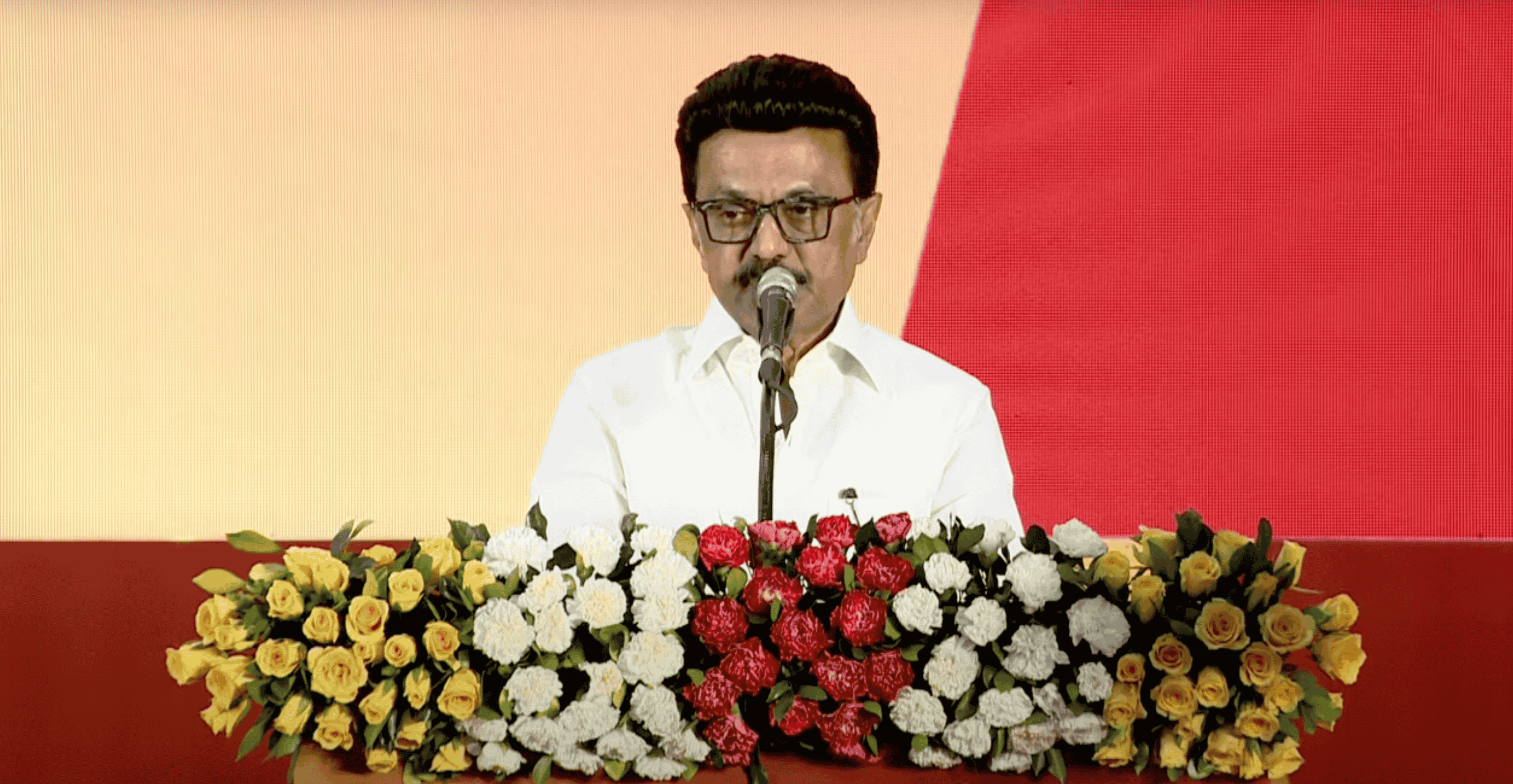Published Aug 23, 2025 | 3:28 PM ⚊ Updated Aug 23, 2025 | 3:28 PM

Tamil Nadu Chief Minister MK Stalin
Synopsis: He accused the BJP government of imposing various legal and administrative hurdles against Opposition-ruled states, including undermining the independence of Finance Commissions and denying states their rightful fiscal share.
A national seminar on Union–State Relations was organised by Tamil Nadu government under Chief Minister MK Stalin at the Kalaivanar Arangam in Chennai on Saturday, 23 August.
The event saw participation of scholars, former justices, and ministers. On the occasion, the Tamil Nadu government launched the official website of the high-level committee on Union–State Relations headed by former Supreme Court judge Kurian Joseph. The portal allows people across India to share their views, and a questionnaire form was also released today.
In his address, Stalin urged all chief ministers across India to set up similar committees on state autonomy.
The chief secretary of Tamil Nadu, N Muruganandam (IAS), welcomed the gathering. Justice Kurian Joseph, chairperson of the high-level committee, in his introductory note said, “The Constitution that defines the nation is greater than the nation itself.”
Former Supreme Court judge Justice J Chelameswar then spoke on the theme “Federalism and the principle of Subsidiarity, and Centralisation in India since 1950”.
In his lecture, he questioned the very definition of the Indian Union, asking: “What is India? What makes it a Union?” He elaborated on how federalism and the principle of subsidiarity have gradually been eroded by creeping centralisation over decades.
Stalin delivered the keynote address. He stated that Tamil Nadu continues to lead in various sectors such as education and healthcare compared to many other Indian states. The state also contributes significantly to the Union government’s revenues through GST. Yet, he alleged, the Centre discriminates against Tamil Nadu by denying its fair fiscal share.
He recalled that in 1967, when CN Annadurai presided over as Chief Minister, he had emphasised in his Assembly speech the need to restructure the Constitution to give more rights to the states. Following this, in 1969, Karunanidhi set up the Rajamannar Committee to study Centre–State relations.
அதிகாரம் ஒரே இடத்தில் குவிந்தால் வீக்கமாகுமே தவிர, அது வலிமையாகவோ வளர்ச்சியாகவோ ஆகாது!
அதுவும் ஒரு துணைக்கண்டத்துக்குரிய வேற்றுமைகளோடு பரந்துபட்டுள்ள இந்தியா போன்ற ஒன்றியத்தில் உண்மையான கூட்டாட்சியும் மாநில சுயாட்சியும் அடிப்படையாகவே இருக்க வேண்டும்!
இதை உணர்ந்துதான்… pic.twitter.com/HIUb07SXlh
— M.K.Stalin (@mkstalin) August 23, 2025
The committee had submitted its report on 27 May 1971. Based on it, on 14 April 1974, the TN Assembly passed the State Autonomy Resolution, with Karunanidhi writing to then prime minister Indira Gandhi to press the demand. Stalin stressed that even today, many of the Rajamannar Committee’s recommendations remain valid.
He accused the BJP-led Union government of deliberately discriminating against non-BJP-ruled states.
“Tamil Nadu, Kerala, West Bengal, Punjab, Jharkhand, Telangana, and Karnataka are all ruled by non-BJP governments. Jammu and Kashmir should have been on this list too, but in violation of constitutional principles, the Union government dissolved the elected government, imposed Governor’s rule, and later downgraded J&K into a Union Territory under its direct control.”
He noted that the DMK, along with Congress, Viduthalai Chiruthaigal Katchi, CPI, CPI(M), and other allies, had opposed this “anti-federal” act.
Stalin explained that the newly formed committee under Justice Joseph was tasked with reviewing violations of federal principles in the last 50 years and recommending necessary constitutional amendments to safeguard state rights.
He pointed out how previous commissions on Centre–State relations were ignored:
Despite these hurdles, Stalin said, Tamil Nadu continues to be recognised for its good governance.
He accused the BJP government of imposing various legal and administrative hurdles against Opposition-ruled states, including undermining the independence of Finance Commissions and denying states their rightful fiscal share. Yet, he said, the Dravidian Model of governance in Tamil Nadu had ensured strong financial management. Even during a period of fiscal stress, the state recorded 11.9 percent growth in 2024–25, the highest in 14 years.
He noted that the anti-Hindi sentiment long voiced by Tamil Nadu is now being echoed by several other states.
“In Karnataka and West Bengal, voices are rising in support of a two-language policy. In Maharashtra, Raj Thackeray and Uddhav Thackeray jointly led an anti-Hindi rally, forcing the BJP-led coalition there to announce a two-language policy.”
Concluding his address, Stalin declared: “Only strong and self-reliant states can make India stronger. Weak states cannot uplift India. Those who truly care about Indian unity must raise their voices for state autonomy. I urge all states to form committees on state autonomy. We need constitutional amendments to replace the current centralised federalism with genuine autonomy for states.”
(Edited by Amit Vasudev)

